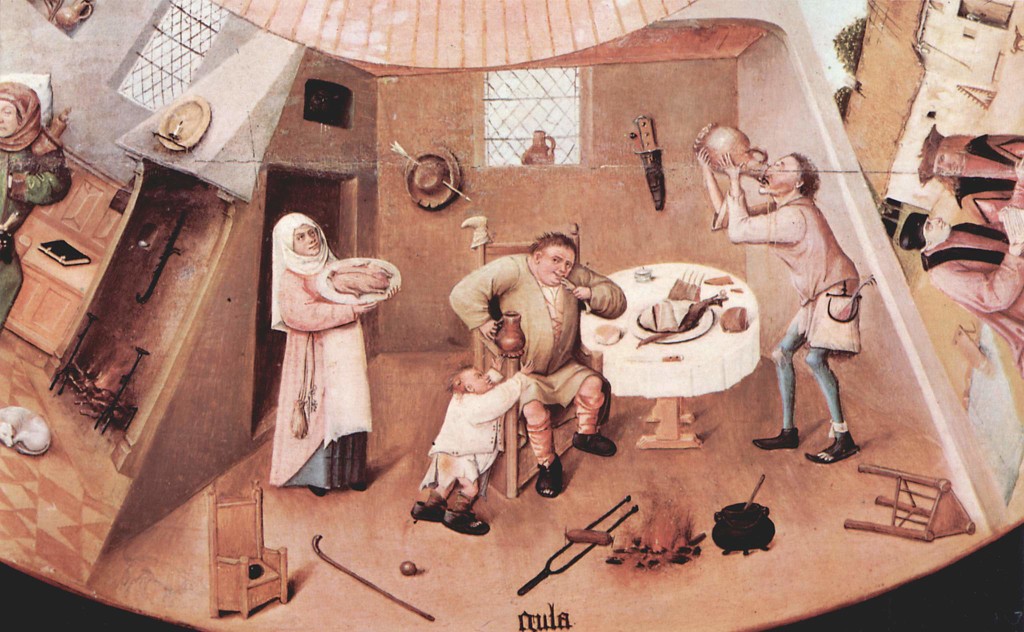[featured-image single_newwindow=”false”]The Traditional Depiction of Gluttony[/featured-image]
In the process, however, we have turned all of our energy towards food and now our extremely high standards have made us uncharitable and very hard to please.
Screwtape paints the situation in this way,
One of the great achievements of the last hundred years has been to deaden the human conscience on [gluttony]….This has largely been effected by concentrating all our efforts on gluttony of Delicacy, not gluttony of Excess…..[The Patient’s Mother] is a positive terror to hostesses and servants. She is always turning from what has been offered her to say with a demure little sigh and a smile ‘Oh please, please…all I want is a cup of tea, weak but not too weak, and the teeniest weeniest bit of really crisp toast’….she never recognizes as gluttony her determination to get what she wants, however troublesome it may be to others…..
The woman is in what may be called the ‘All-I-want’ state of mind. All she wants is a cup of tea properly made, or an egg properly boiled, or a slice of bread properly toasted. But she never finds any servant or any friend who can do these simple things ‘properly’–because her ‘properly’ conceals an insatiable demand for the exact, and almost impossible, palatial pleasures…Meanwhile, the daily disappointment produces daily ill temper: cooks give notice and friendships are cooled. (87-89, emphasis added)
Generally speaking, the sin of gluttony is “the excessive indulgence in food and drink” (Catholic Encyclopedia). Saint Thomas Aquinas then specifies gluttony into two definitions,
[G]luttony denotes inordinate concupiscence in eating. Now two things are to be considered in eating, namely the food we eat, and the eating thereof. Accordingly, the inordinate concupiscence may be considered in two ways. First, with regard to the food consumed: and thus, as regards the substance or species of food a man seeks “sumptuous”–i.e. costly food; as regards its quality, he seeks food prepared too nicely–i.e. “daintily”; and as regards quantity, he exceeds by eating “too much.”
Secondly, the inordinate concupiscence is considered as to the consumption of food: either because one forestalls the proper time for eating, which is to eat “hastily,” or one fails to observe the due manner of eating, by eating “greedily.”
Isidore [De Summo Bon. ii, 42] comprises the first and second under one heading, when he says that the glutton exceeds in “what” he eats, or in “how much,” “how” or “when he eats.” (Summa, II-II, Q. 148, Art. 4)
A great summary of this sin is found in Philippians 3:19, “their own hungry bellies are the god they worship.”
Obesity is a worthy cause to fight and our bodies are “temples of the Holy Spirit.” We should eat properly and strive to eat food that is healthy. However, charity is still a virtue that we must exercise, especially when we are guests at someone’s house.
We must not let our love of food rule our lives and be the primary standard for all the choices we make.
We should remember the poor in this world. They are not able to choose what they eat; they do not have that luxury that most of us possess. They simply eat what is put before them and are eternally grateful for what they are given, for they do not know when they will eat next.
We could learn from the poor and while we should make conscious decisions concerning food, we should also be very grateful for what we have and for what someone has given us. Someone has taken the time and energy to make something to nourish our bodies; we should be thankful for that.
As in all things, we must be prudent and form our conscience well so that we can make the right decisions.
————-
***If you would like to follow-along reading the The Screwtape Letters, I suggest to purchase your own copy of C.S. Lewis’ The Screwtape Letters. If you don’t like reading, I highly suggest buying the dramatization of the letters by Focus on the Family, called The Screwtape Letters: First Ever Full-cast Dramatization of the Diabolical Classic (Radio Theatre)
. It features Andy Serkis, who played Gollum in The Lord of the Rings and The Hobbit and is well produced.
Read the Entire Series
- #13: Two Reasons Why the Devil Wants us to Shop Around for the “Best” Parish
- The Enemy’s Tactic #12: Why the Devil Hates the Present Moment
- The Enemy’s Tactic #11: How the Devil Redefines Humility
- The Enemy’s Tactic #10: The Safest Road to Hell is the Gradual One
- The Enemy’s Tactic #9: The Trap of Living a Double Life
- The Enemy’s Tactic #8: How the Devil Twists Pleasure into a Stumbling Block for Many
- The Enemy’s Tactic #7: How the Devil Hides his Existence with Red Tights and a Pitchfork
- The Enemy’s Tactic #6: How Satan Encourages us to be Charitable to People we Do Not Know
- The Enemy’s Tactic #5: How the Devil Tricks us into Believing that Death Will Never Come
- The Enemy’s Tactic #4: Stripping the Liturgy
- The Enemy’s Tactic #3: Daily Pinpricks
- The Enemy’s Tactic #2: Focusing on Sinners in the Church
- The Enemy’s Tactic #1: The Loss of Reason
- In the Enemy’s Camp: An In-depth Look at the Tactics of the Devil

